I re-read two books in my collection this week. The first one, Genome, by Matt Ridley has done quite a good job explaining modern genetics in layperson terms the 'formidable thicket of jargon'. All too often I have had accusations thrown at me saying I am out of touch with the society at large, and stuck inside the ivory tower doing my little nano-scale experiments.
Imagine the (human) genome is a book.
There are twenty-three chapters, called CHROMOSOMES.
Each chapter contains several thousand stories, called GENES.
Each story is made up of paragraphs, called EXONS, which are interrupted by advertisements called INTRONS.
Each paragraph is made up of words, called CODONS.
Each word is written in letters called BASES.
*
The idea of the genome as a book is not, strictly speaking, even a metaphor. It is literally true. A book is apiece of digital information, written in linear, one-dimensional and one-directional form and defined by a code that transliterates a small alphabet of signs into a large lexicon of meanings through the order of their groupings. So is a genome. The only complication is that all English books read from left to right, whereas some parts of the genome read from left to right, and some from right to left, though never both at the same time. (pp 7 - 8)

In some places, they call it Experimental Breeding. In Harry's world, it is banned.
*The second book (actually,
books) was
Alice. Most of my favorite (fiction) books are children's books - including but not limited to
The Wind in the Willows, Harry Potter and
Pooh.It seemed I am not alone. As Roger Green wrote in the Introduction:
"
Alice, it is maintained, contains much that can be appreciated only by the adult reader; the same is true of many other writers whom we enjoyed first in childhood or youth...There is satire, allusion, even intentional symbolism in
Alice that in most cases can be understood and enjoyed consciously only by older readers...These deeper meanings seem to give an added dimension, and with it some measure of immortality to humorus fantasy..."
I'd give all the wealth that years have piled,
The slow result of Life's decay,
To be once more a little child
For one bright summer-day.
(Charles Dodgeson, aka Lewis Carroll, 1853, written when he was 21)
*Next on my list (to buy from Amazon) will be
The Red Hourglass.




























